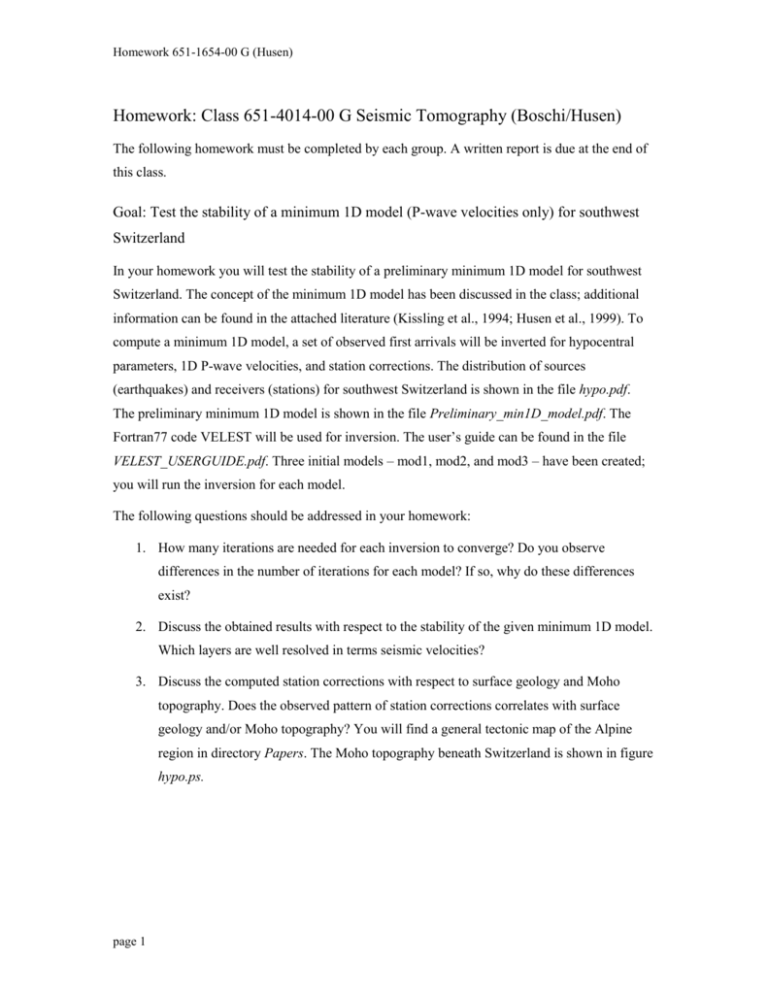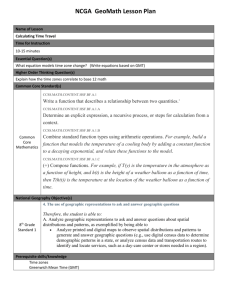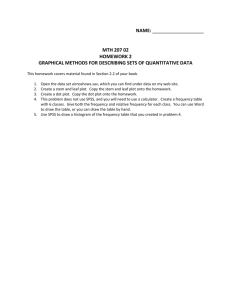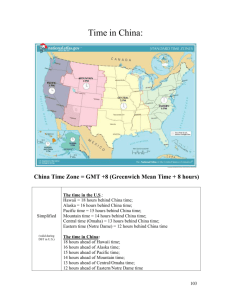read the document homeworkSH
advertisement

Homework 651-1654-00 G (Husen) Homework: Class 651-4014-00 G Seismic Tomography (Boschi/Husen) The following homework must be completed by each group. A written report is due at the end of this class. Goal: Test the stability of a minimum 1D model (P-wave velocities only) for southwest Switzerland In your homework you will test the stability of a preliminary minimum 1D model for southwest Switzerland. The concept of the minimum 1D model has been discussed in the class; additional information can be found in the attached literature (Kissling et al., 1994; Husen et al., 1999). To compute a minimum 1D model, a set of observed first arrivals will be inverted for hypocentral parameters, 1D P-wave velocities, and station corrections. The distribution of sources (earthquakes) and receivers (stations) for southwest Switzerland is shown in the file hypo.pdf. The preliminary minimum 1D model is shown in the file Preliminary_min1D_model.pdf. The Fortran77 code VELEST will be used for inversion. The user’s guide can be found in the file VELEST_USERGUIDE.pdf. Three initial models – mod1, mod2, and mod3 – have been created; you will run the inversion for each model. The following questions should be addressed in your homework: 1. How many iterations are needed for each inversion to converge? Do you observe differences in the number of iterations for each model? If so, why do these differences exist? 2. Discuss the obtained results with respect to the stability of the given minimum 1D model. Which layers are well resolved in terms seismic velocities? 3. Discuss the computed station corrections with respect to surface geology and Moho topography. Does the observed pattern of station corrections correlates with surface geology and/or Moho topography? You will find a general tectonic map of the Alpine region in directory Papers. The Moho topography beneath Switzerland is shown in figure hypo.ps. page 1 Homework 651-1654-00 G (Husen) Detailed Instructions: - Invert each data set in the directories mod1, mod2, and mod3 using VELEST. This is done by running VELEST in each of the directories using the following command: [path-to-velest-exectubale]/velest, e.g. on datconv: /Users/stephan/bin/G5/velest - Plot the reduction in data variance (DATVAR) and in RMS (RMS RESIDUAL), over number of iterations to determine the numbers iterations needed for each inversion to converge. DATVAR and RMS RESIDUAL are printed in the VELEST output file *.vel. - Plot the results for each inversion, i.e. initial and final velocities, and station corrections. To plot station corrections you can use the GMT script statcor.gmt in the directory Plotting. The script statcor.gmt should be run in the directory Plotting. To plot initial and final velocity models you can use the GMT script vp_plot.gmt in the directory Plotting. The script vp_plot.gmt should be run in the directory Plotting. - page 2 Discuss the results by answering the questions 1-3. Homework 651-1654-00 G (Husen) Content of provided files and directories: homework.doc -> This document! hypo.pdf -> Distribution of sources and receivers, incl. Moho topography. Preliminary_min1D_model.pdf -> Preliminary minimum 1D model for southwest Switzerland mod1, mod2, mod3 -> Data sets mod1, mod2, and mod3. Papers -> Literature in PDF format Plotting -> GMT scripts statcor.gmt and vp_plot.gmt, including auxiliary scripts UsersGuide -> Documentation on VELEST velest -> source code of VELEST If you experience problems please contact me: email: husen@sed.ethz.ch phone: 044 633 4409. Good luck with your homework! Stephan Husen page 3











